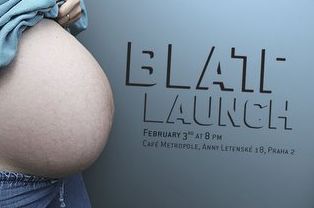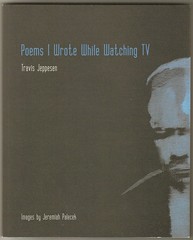scarecrow interviews

Wednesday, June 14, 2006
Travis Jeppesen Interview: A particular way of looking...

Lee Rourke: How did the idea for "Poems I Wrote While Watching TV" materialize?
Travis Jeppesen: After a string of bad experiences that led me to not write anything significant for nearly the entire year after Victims came out, I found myself alone for the first time in a long while, living in a big empty apartment in Prague. I was trying to improve my Czech, so I was watching TV a lot. But as anyone who has lived in this country can tell you, Czech television is notoriously terrible and boring, so I picked up my pen, more as a nervous reflex than anything else. A lot of the material is really raw, perhaps embarrassingly so. I took out the really terrible ones and replaced them with more recent poems, for better or for worse. Some of the remaining poems make me wince now when I read them, but I decided to leave them in anyway. They form a sort of constellation of where I was, where my mind was at during that time, and I'd rather have that to look back on than some polished version of it that serves no purpose other than to cover up the many cracks in the wall.
Jeremiah Palecek and I met not long after he moved to Prague, I imagine this was 2003. I instantly became interested in his work. He's incredibly prolific as a painter, he basically just paints all day. Only now he also makes music, as well. He knew my writing, and we discussed collaborating before, but weren't sure what form it would take. At the time, Jeremiah's paintings were all taken from stills from television shows. Then I remembered this TV Poems manuscript I had laying around, so it made sense that the two projects could potentially fit together as a book. So we started talking about it, then tried to figure out who might publish the thing, at which point I think I got depressed and lost interest in the project. Then, I believe it was late last year, we started talking about it again, and at one point just said, fuck it, we should put this out ourselves. And that was the beginning of BLATT Books. Josh Cohen and I, we were editing the PLR at the time and were already talking about starting a publishing imprint of some sort. And then Miro Peraica came along and offered to become the publisher of BLATT, and then the whole thing was cemented.
LR: Do you see poetry as a significant means of communication in today's media saturated world?
TJ: No, and to be honest, I don't see poetry as a vehicle for communication, period. Look, we have to face the facts here. Most poets I know are either dusty academics or stinky hippies rotting in the snotty tears of their own obscurity. If I'm looking for inspiration, I won't go to a poetry reading. I'd rather go to a heavy metal concert. In fact, I think poetry should move in the direction of heavy metal. What's at stake here is a poetics that's rooted in an amplification and subsequent distortion of pure thought. At least that's where I'm coming from: amplification + distortion. I mean, when I'm writing, and it's good, I don't feel like I'm writing a poem. I feel like I'm composing a fucking symphony.
So to answer your question:
communication -- no
disruption -- yes
LR: The death of Language - is it really dead?
TJ: No. Of course not. I think a particular way of looking at, of using language, is dying, though. Increasingly, language's sole function is to convey information -- nothing more, nothing less. This goes for literature, also, which is perhaps the most shocking aspect of the whole deal. The reasons are quite obvious, and so not worth going into at great length. The media-saturated age we live in, blah blah blah, but it's depressing to think that all these external factors have had such a strong impact on the way we view the function of literature. I'm coming out of a conception of literature based on pure subjectivity, in which each individual uses the units of their mother tongue to compose their own language. This is what writers are supposed to do. Fuck pandering to the masses, fuck the universal experience. We should be using language as a tool to create new meanings; not resonating with the conceits of a past-present that ultimately eludes us.
The problem is we've lost the readers who are looking for this kind of experience I'm attempting to describe. People read for other reasons now. Namely re-affirmation. Of what they already know, or a distant fantasy that they can somehow relate to their everyday lives, their aspirations. Not realizing, of course, that the present conditions are insipid, that we're drowning in a lake of stupidity. So this gives the writer a double task: not only must the writer effectively create a new language, we must also create a new reader. If you look at other art forms where "formal experimentation," for lack of a better term, is desirable, even expected -- music, visual art, film -- you'll find that the same people who consume the most "difficult" work shy away from literature that takes similar risks. No one ever asks why. It's time to start asking these questions.
The other thing I've noticed is that the only playfulness that's allowed has to come through the guise of irony. Everything has to be ironicized, and you see this in every single novel that comes along nowadays that is hailed by the literary establishment as the New Important Novel of the Year. Everything is so nudge-nudge, wink-wink, it makes me puke. Moreover, it's gotten to be like that in the real world, also. You can't have a casual conversation with anyone anymore about anything. Instead, the idea is to show off how clever and crafty you are by desperately loading every sentence you mutter with a double meaning. Sometimes I can roll with it, other times I just want to squish the other person's head under my armpit. In the end, you wind up saying nothing, and remembering nothing of the conversation. So there we are. That Warholian shallowness in the guise of "art for art's sake," which was never really art to begin with, has triumphed, and we're finally living in an era of profound emptiness and antipathy. What's next?
(On a related note, I have seen ample evidence that literacy is indeed dying out, at least in the English-speaking world. I’d say that when adults who have been using the English language for their entire lives can no longer express themselves in that language abiding by the written rules of spelling and grammar, then yes, our language is in trouble.)
LR: The birth of Blatt is quite an extraordinary thing - is it your ideal? Does a print-format literary magazine still sit above a growing tide of electronic-based Litzines/blogs. The PLR was primarily internet-based wasn't it?
TJ: No, the PLR was a print mag. We had more of an Internet presence than BLATT (always written in upper-case letters), though, for the simple reason that our art director, Mario Dzurila, had more time then than he does now. With BLATT, his duties have really increased, as the whole operation is much larger -- we now publish books, sponsor events, all this in addition to the magazine. On top of his duties for BLATT, he also has a full-time job, so at the end of the day, if one thing has to be sacrificed, then it's going to be the website, I'm afraid.

It should be stressed that I really don't do that much for BLATT. It's mostly the work of my colleagues -- Dzurila, but also publisher Miro Peraica and my co-editor Joshua Cohen. I think they're the real heroes in this story. I'm certainly present at all the discussions regarding BLATT, but I'm certainly not the mastermind behind it. I'm a small fraction of the equation.
There are a million pros and cons on each side of the print vs. online debate. Obviously we can't be as inclusive as we'd like, because we have limited space. In the real world, as opposed to the virtual world, space equals money. In a way, I wish it could be a much bigger thing than it currently is, the magazine, I mean, but we just don't have time. We all work, we have our day jobs and our multiple projects. But we're increasingly trying to filter everything we do through BLATT somehow. This includes taking it out into the "real world" by organizing regular events featuring writers from the magazine. We're doing a regular reading series in New York now at the Galapagos art space in Brooklyn, and of course we have readings at Cafe Metropole in Prague -- we just closed our first season of that with a five day festival that brought together important writers from all over the world. It was really more like a five day party, a lot more fun than your average literary festival. I'm still trying to remember it.
The other major part of the BLATT project is our new publishing imprint. We're hoping to put out 3-4 books a year to begin with. Our next project will be a Raymond Federman reader. We're also hoping to put out books by Peter Sotos and Stephen Rodefer in the near future.
LR: You're the author of a wonderful novel Victims - any more novels in the pipeline?
TJ: Yesiree, thanks for asking. My new novel, Wolf at the Door, will be published sometime in late 2007 by the great Twisted Spoon Press. There's another novel sitting around, growing fungi. I'm not sure what will happen to it. I try not to speculate.
LR: Who, if any, are your literary influences?
TJ: I had a few very important teachers who showed me possible directions. Naomi Iizuka was there early on, when I was still in my teens, really. Lynda Schor. Reading Kathy Acker marked a huge transitional point in my writing. These days, I find solace whenever I read or speak to Peter Sotos. His voice is kind of a light at the end of a dark tunnel for me. Bruce Benderson has also been a tremendous presence. I could listen to him speak for hours (and sometimes have!) He taught me basically everything I know about translation.
It might sound corny, but I really like taking walks. Any kind of movement, really -- that's where the real writing happens. I live in the middle of an average-sized continent; I really like being able to board a train, then in two hours time, I'm in a completely different country with a history and culture all its own. There's nothing quite like the sense of displacement that travel induces. No drug can replicate that.
Other than that, and this might be obvious, but I like to look at things. I'd say I'm more influenced by what goes on around me, by art and film and movies, than I am by most literature. Cy Twombly and Sunn 0))) are just as important to me these days as Beckett, Mallarmé, Bernhard, Stein...
LR: In light of 3AM's least influential list could you point us towards any writers, editors, freaks and publishers you feel worthy of more attention?
TJ: Oh yeah. Joshua Cohen, Stephen Rodefer, Mario Dzurila, Howard Sidenberg of Twisted Spoon Press, Brane Mozetic, Ewald Murrer, David Markson, Peter Sotos, Clark Coolidge, Michael Brodsky, Joanna Gunderson, Tod Thilleman, James Chapman of Fugue State Press. These people are all gods who would normally be celebrated, were we not living in such a ruinous era.
LR: Thanks very much Travis...
Travis Jeppesen © 2006.

Travis Jeppesen was born. He wrote a novel. It's called Victims. It was published in America by Akashic Books, and in Russia by Eksmo. His new book is called Poems I Wrote While Watching TV. It has illustrations by Jeremiah Palecek, and will come out in March. His work has/will appear(ed) in Purple, Prague Literary Review, 3am Magazine, Another Magazine, ZOO, thefanzine.com, New York Press, Bookforum, Pretend I Am Someone Else, Thee Flat Bike, dorfdisco.de, Pavement Magazine, Shampoo Poetry, Can We Have Our Ball Back, and a bunch of other places you've probably never heard of. He edits BLATT.
His new collection of poems [Poems I Wrote While Watching TV] can be ordered HERE.
